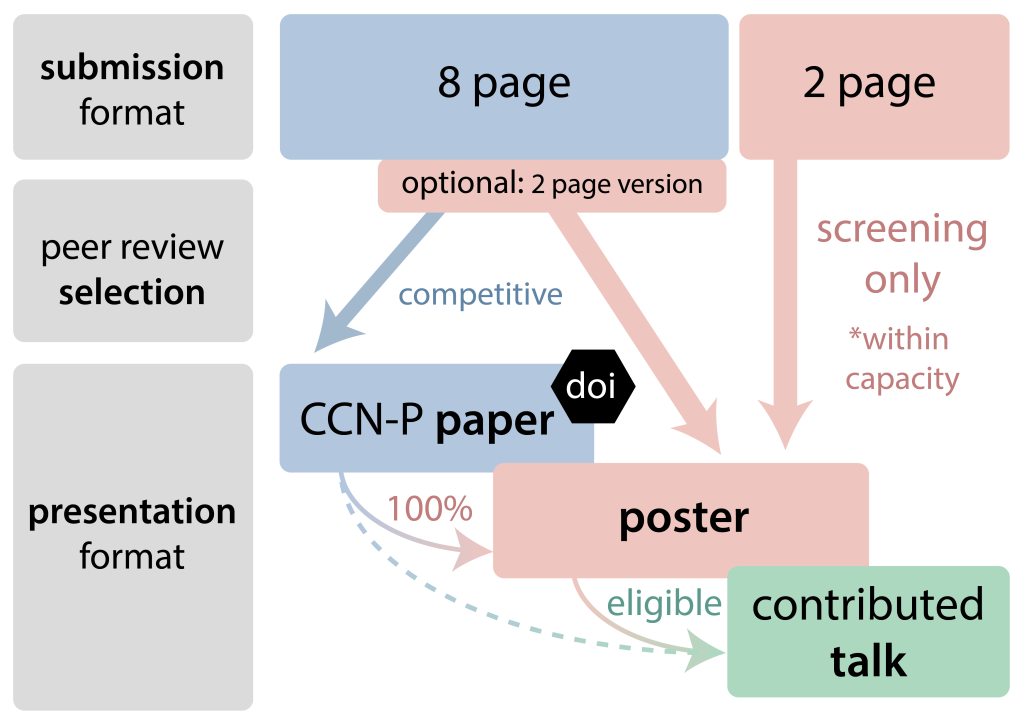Call for Papers
Submissions for both 8-page papers and 2-page papers have Closed
Two-track submission system
CCN 2025 will offer two submission tracks: 2-page Extended Abstracts (“2-pagers”) and 8-page Full Conference Papers (“8-pagers”). OpenReview will serve as the platform for submission of both types.
2-pagers that align with the conference scope will generally be accepted, up to a maximum capacity of 800 posters. Accepted 2-pagers will be accessible through OpenReview. See information on paper submissions for more details.
8-pagers will undergo competitive selection. Accepted papers will be published in the CCN Proceedings (CCN-P) with DOI assignment on OpenReview. Authors of rejected 8-pagers will have the option to submit a 2-pager instead during the "camera-ready" phase of the process, again up to a maximum capacity of 800 posters. Contributed talks will be selected from both accepted 8-pagers and 2-pagers, including the 8-pagers rerouted to 2-pagers. See information on paper submissions for more details.

Figure 1. Submission Pathways for CCN 2025. The conference now offers two parallel tracks for submissions. The traditional extended abstract track (right) accepts 2-page submissions that meet scope and quality requirements for poster presentation, and are eligible for oral presentation selection. The new conference proceedings track (left) accepts 8-page submissions and implements a competitive acceptance rate, with accepted papers published with DOI in CCN Proceedings (CCN-P). All accepted papers in both tracks receive a poster presentation and are eligible for Contributed Talk selection. Submissions rejected by the CCN-P track are rerouted to the 2-page submission track for an acceptance decision (with another chance for oral presentation).
Background on CCN's Conference Proceedings track
The introduction of a conference proceedings track is a response to our research community's needs. Traditional academic journals, while important for feedback and quality control, also introduce challenges including high costs and often lengthy publication timelines. While journals like PLoS Computational Biology, Cognitive Science, and eLife already offer some relief with lower costs of publishing and gold open access, machine learning conferences such as NeurIPS, ICLR, and ICML also demonstrate how conference proceedings with high peer review standards can foster rapid, affordable, and high-quality scientific communication.
CCN covers research at the intersection of AI, Neuroscience, and Cognitive Science. This convergence of fields presents a unique challenge and an opportunity to adopt publishing formats that resonate with researchers across these domains. We anticipate that the introduction of a long-form conference proceedings track, a format that has proven successful in the computer science and cognitive science communities, will benefit a substantial part of the researchers working at the intersection of these diverse fields. There is a lot of excitement and energy in the community, and we believe this new format will help us to, together, reach a higher standard of reviewing and editorial decisions, which will empower and democratize the CCN community.
In making this change, we've been careful to preserve what already works well. The traditional poster track, with its 2-page abstracts, remains unchanged, except that we will not be assigning DOIs to them. Parallel submission to other venues is allowed. This ensures that our existing community members continue to have the same opportunities for presentation and scientific exchange that have made CCN a valuable venue. The new proceedings track, therefore, complements but does not replace our established format, thereby enriching the conference's ability to serve our evolving research community.